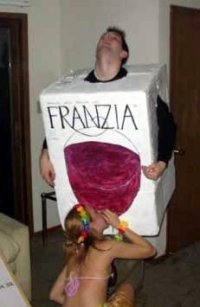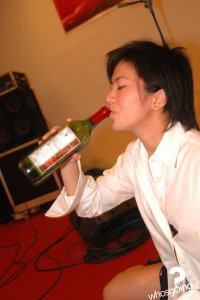PARIS (Reuters) - One of France's oldest champagne producers is testing a new way of ageing its bubbly: on the seabed off northern France.
Louis Roederer wants to find out if its wine tastes better if it is kept in cold sea water and rocked by currents than in the cellars of the city of Reims, where it is normally stored.
Roederer said on Monday it had placed several dozen bottles 15 metres (50 feet) underwater in the bay of Mont Saint-Michel, a rocky tidal island off the coast of Normandy, last weekend.
A cellarman came up with the idea after realising that the water temperature in the bay, a constant 10 degrees Celsius (50.00F), was ideal for ageing wine.
In 12 months' time, Roederer will hold a tasting session to compare champagne from the bottles kept on the seabed with those from its cellars.
Roederer is the first producer to test the unusual ageing method for sparkling wine. Other firms have tried it out in the past four years for still wines, including red Crozes-Hermitage, white Muscadet and white Burgundy.
"It would appear that tides and the cold water had less of an impact on red wines than on white wines," Herve Boucton, commercial director for Roederer, told Reuters.
Roederer, founded in 1776, is one of France's last independent family-owned champagne makers and its bottles are among the most expensive in the country as production is small -- accounting for about 1 percent of total champagne production.
Astrid Wendlandt
Tuesday, June 3, 2008
RIESLING ON THE UP AND UP
An article in Eastside Business highlights Riesling's resounding success in recent years, making it the fastest growing white wine varietal for the third straight year, according to Nielsen. During the 12 month period ending May 3, 2008, Riesling was the fastest growing white varietal and second fastest growing of all varietals after Pinot Noir. Additionally, sales of Riesling have increased 54% over the past 3years.
Washington state's Chateau Ste. Michelle is a leading global Riesling producer and a category leader. Chateau Ste. Michelle winemaker Bob Bertheau says one of the best things about Riesling "is that it tends to be low in alcohol, yet high in character, aromatics and flavor," making it a wonderful companion to spicy food.
Chateau Ste. Michelle has been a champion of Riesling for more than 40 years and was among the first to plant Riesling in the state of Washington.
"We attribute our success with Riesling to the unique growing conditions of Washington state, which is ideally suited for Riesling, as well as our long term commitment to producing top quality Riesling," said Ste. Michelle Wine Estates president Ted Baseler.
Wine & Spirits Daily
Washington state's Chateau Ste. Michelle is a leading global Riesling producer and a category leader. Chateau Ste. Michelle winemaker Bob Bertheau says one of the best things about Riesling "is that it tends to be low in alcohol, yet high in character, aromatics and flavor," making it a wonderful companion to spicy food.
Chateau Ste. Michelle has been a champion of Riesling for more than 40 years and was among the first to plant Riesling in the state of Washington.
"We attribute our success with Riesling to the unique growing conditions of Washington state, which is ideally suited for Riesling, as well as our long term commitment to producing top quality Riesling," said Ste. Michelle Wine Estates president Ted Baseler.
Wine & Spirits Daily
Australian Imports Stall in U.S.
Based on a report by Macquarie Research's Andy Kovacs, Australian imports, particularly Foster's Group, has underperformed in the tough U.S. market so far in the second half of 2008.
U.S. WINE MARKET. Andy remarked that the U.S. wine market is holding up under pressure but there is some disparity within, namely between states. In January to April, market wine volumes and price both grew at approximately 3%. However, the following inconsistencies remain: California is particularly soft; consumers are switching to wine clubs; low to mid-range wines are squeezed; and imports, particularly Australian, are declining.
CHALLENGES FOR FOSTER'S. Foster's, according to the note, is falling in the underperforming category. Gomberg Fredrikson data suggests that Foster's wholesaler shipment volume is down -36% for the third quarter in 2008, mainly due to a first quarter buy-up of blush wine.
Nielsen also indicates declining consumer demand, with Foster's volume and value down -5% and -1%, respectively, for January through April, compared to the total market's volume and sales growth of 2% and 6%.
Andy notes that the Australian wine segment is losing appeal in the U.S., with trade feedback suggesting the category has matured. Australian export data supports this view, with third quarter volumes to the US down -30%. Macquarie's research also suggests that another cause for concern is that many of Foster's brands "are showing poor 'health.'" Nielsen data shows that two-thirds of Foster's top 10 brands are declining (volume and value) to April 2008.
Wine & Spirits Daily
U.S. WINE MARKET. Andy remarked that the U.S. wine market is holding up under pressure but there is some disparity within, namely between states. In January to April, market wine volumes and price both grew at approximately 3%. However, the following inconsistencies remain: California is particularly soft; consumers are switching to wine clubs; low to mid-range wines are squeezed; and imports, particularly Australian, are declining.
CHALLENGES FOR FOSTER'S. Foster's, according to the note, is falling in the underperforming category. Gomberg Fredrikson data suggests that Foster's wholesaler shipment volume is down -36% for the third quarter in 2008, mainly due to a first quarter buy-up of blush wine.
Nielsen also indicates declining consumer demand, with Foster's volume and value down -5% and -1%, respectively, for January through April, compared to the total market's volume and sales growth of 2% and 6%.
Andy notes that the Australian wine segment is losing appeal in the U.S., with trade feedback suggesting the category has matured. Australian export data supports this view, with third quarter volumes to the US down -30%. Macquarie's research also suggests that another cause for concern is that many of Foster's brands "are showing poor 'health.'" Nielsen data shows that two-thirds of Foster's top 10 brands are declining (volume and value) to April 2008.
Wine & Spirits Daily
Subscribe to:
Posts (Atom)



